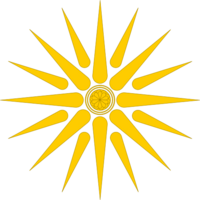Atruneanism
| Part of a series on |
| Atruneanism |
|---|
 |
| Religion in Esquarium |
| Beliefs |
| Organization |
| Tradition and practice |
| See also |
Ríkr Átrunaðr (Great/Magnificent Faith) is one of the world oldest active religious philosophies and the state-religion of Sjealand, Eibenland and Ferhard. It is a Monotheism (i.e. a single creator god) but with monolatric and Pantheist elements. The faith is centered of the dualistic principles of the Divine and the Living, with two definitions of a god. Ascribed to the teachings of the Sjealandic prophets and Atrunean deities Kauna, Berkana, Ansur and Vunjø it exalts a central deity of wisdom, eternity and the soul, Stórrheðrinn (The Greatness) as its Supreme Being. However contrary to many other monotheist religions Ríkr Átrunaðr also exalts deities born as mortal humans and deified by Stórrheðrinn as Guardian Gods for the Sjealandic people and other worshippers. While Stórrheðrinn can be viewed in the same light as other omnipotent monotheistic deities, the Human Deities are more similar to very powerful angels or deities in polytheistic religions.
According to Atrunean teachings the early Atruneans worshipped Stórrheðrinn through worship of the natural worship but as great migrations began from their homeland in modern day Eibenland to the faiths cradle of Sjealand in the 350's BCE, Storrhedrin subconsciously guided the 4 prophets of Kauna, Berkana, Ansur and Vunjø. According to tradition upon reaching the promised land in modern day Sjealand, Stórrheðrinn guided the prophets and their people to the tallest mountain in the region, where he elevated all four of them to divinity, leaving their lifeless mortal husks to collapse. The prophets, now raised to Godhood and knowledgeable to Stórrheðrinns existence and will revealed themselves to their stunned people, laying the foundation for the religion. Upon Valdemar the Greats unification of Sjealand in the 750´s CE the religion was placed as the state religion of Sjealand and after careful deliberation the Atrunean clergy declared the Sjealandic Monarch the secular caretaker of the Atrunean believers. Current numbers of Atrunean worshippers are estimated to be around 100 million in Nordania and many others beyond, but as the faith also recognizes other religions as valid interpretations of Stórrheðrinns will, and with the number of religions syncretic with Ríkr Átrunaðr varying, the number is unknown.
The most important texts of the religion are those of the Chant of Light (Lysets Sang), which includes the teachings of the lesser deities on the nature of Stórrheðrinn and the mortal soul. This is written in poetic prose with poems that define Stórrheðrinn, the fall of belief, the birth of a light soul and the trials it must face to preserve its life. In Ríkr Átrunaðr Stórrheðrinn is either referred to by its name or as It as Storrhedrin is above being. It is not a being in it of itself, it is all existence made manifest, but so irreparably foreign to a human mind that it cannot be truly comprehended. The other important text of the faith is Mestrrúnir, which details the life and struggles of the four prophets, the rise to divinity and their position as Gods of the people. Unlike Stórrheðrinn they are beings, and are not only gendered but married, Kauna to Berkana and Ansur to Vunjø. The four gods each share a part of the mortal plane as their domain, with their children taking a share of this domain, thus giving worshippers both wide and precise concepts to worship. While Ríkr Átrunaðr has no devil or punishing spirit, it still exalts good deeds and the exaltation of beauty. According to Atrunean doctrine the soul will always be and has always been eternal. It is forever traveling its life in a never-ending series of rebirths as the same person and the actions of the individual either increase their happiness and comfort in their next rebirth or decreases it.
Stórrheðrinn is in its widest form, responsible for all metaphysical aspects of existence, and it is prayed to for peace and tranquality, as it is an all-good creator with the eternal love life has for its beings. Sacrifices to Stórrheðrinn are not given to please or displease it, as it matters not, but simply to show appreciation and the happiness of being content. In Ríkr Átrunaðr, the purpose in life is to "be among those who renew the world and improve it, to make the world progress towards perfection". Selflessness, happiness and charity to ones brothers and sisters is the purest actions and Atrunean can take. Ríkr Átrunaðrs basic maxims include:
- Good Thoughts leads to Good Words leads to Good Deeds. Aspire to it
- There is only one path and that is the path of Truth. Learn from it
- Do the right thing because it is the right thing to do, and then all beneficial rewards will come to you also. Exalt it.